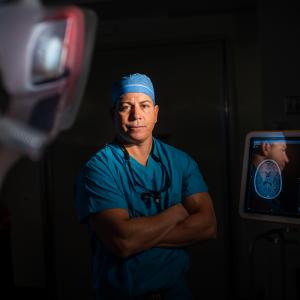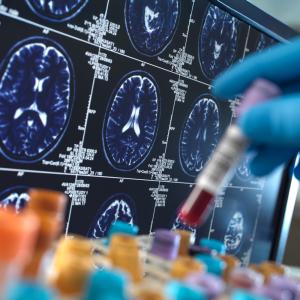
Dr. Alon Mogilner and Dr. Michael Pourfar are able to offer patients treatments that are more targeted and effective thanks to pioneering cutting-edge technology.
Photo: NYU Langone Staff
New technologies pioneered at NYU Langone are helping clinicians home in on brain areas at the root of symptoms that accompany neurological disorders. With advances in deep brain stimulation (DBS), treatments are becoming more targeted, personalized, and effective.
Pioneering Cutting-Edge Techniques to Counter Abnormal Brain Signals
In the past year, NYU Langone’s Center for Neuromodulation added high intensity focused ultrasound (HIFU) to its suite of noninvasive approaches that counter abnormal brain signals associated with essential tremor, becoming one of only two facilities in New York State that offer the procedure.
The promising technology sends a focused ultrasound beam from an external transmitter into the brain to destroy the neural tissue behind unwanted motor symptoms.
“We’ve already had great results using HIFU to treat a small number of essential tremor patients, and we now have a waiting list of patients seeking treatment,” says center co-director Alon Y. Mogilner, MD, PhD, associate professor of neurosurgery and anesthesiology. “Following the procedure, symptoms improve immediately—and the data have shown that HIFU treatment is both safe and highly effective in the long term.”
Because it can be used on only one hemisphere of the brain, HIFU is used to treat essential tremor occurring on the more affected side of the body.
“It’s pretty remarkable to have somebody come in with a tremor they’ve had for 20 years, and then return home the same day with the tremor taken care of.”—Alon Y. Mogilner, MD, PhD
“These patients often suffer from tremors in their dominant hand that challenge their ability to shave, drink, or sign a check—but HIFU treatment helps them regain those functions,” says the center’s other co-director, Michael H. Pourfar, MD, assistant professor of neurosurgery and neurology. “We’re seeing a reduction in symptoms in the range of 70 percent, making this an effective option for patients who aren’t candidates for deep brain stimulation implantation due to age or medical risk or who simply don’t want DBS surgery.”
To confirm that symptoms can be reduced without unwanted side effects, physicians precisely map the brain area, and then apply test doses to produce a temporary lesion.
Once the target is confirmed, the patient receives multiple 30-second treatment doses of HIFU inside an MRI machine in an outpatient procedure that takes just a few hours to complete.
“It’s pretty remarkable to have somebody come in with a tremor they’ve had for 20 years, and then return home the same day with the tremor taken care of,” notes Dr. Mogilner.
Use of HIFU for essential tremor has been approved by Medicare, and private insurance companies are expected to follow suit within the next year. The procedure’s applications could expand considerably as clinical trials explore its use for symptoms associated with other neurological disorders, such as motor function in individuals with Parkinson’s disease.
Next-Generation DBS Devices Result in Enhanced Targeting and Expanded Treatments
NYU Langone has played a leading role in testing and evaluating two novel DBS devices, contributing to their recent approval by the U.S. Food and Drug Administration and advancing them toward more mainstream use. The devices’ electrodes enable more finely tuned targeting of electrical current to the desired brain regions, providing more precise treatment based on patients’ conditions and symptoms.
Center clinicians play a leading role in the evaluation of new devices as they evolve, informing their development by refining the understanding of which device works best for each indication. For example, the directional targeting capabilities of newer DBS devices can be useful in patients prone to DBS side effects, while the proven reliability and MRI compatibility of the traditional device is preferrable for the center’s pioneering use of DBS for patients with Tourette disorder.
“There is no ‘best’ DBS approach,” says Dr. Mogilner. “But there are more options now, which is why we will continue to keep pace as the technology evolves and lead the conversation that helps make these devices even better.”

